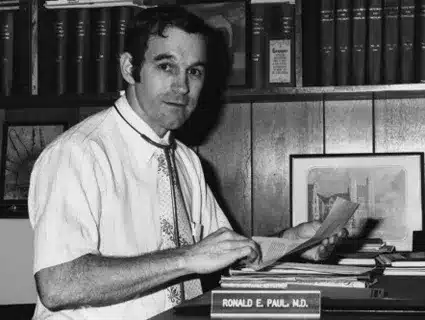For decades, Ron Paul has been the most high-profile supporter of the consistent life ethic in American political life. Consistent life ethicists subscribe to the “premise or theory that all human life is inherently valuable, and therefore, that all humans deserve to live without violence.” Proponents believe in upholding the dignity of the human person in all circumstances, regardless of whether the threat to human life takes the form of abortion, in vitro fertilization, stem cell research, war, euthanasia, assisted suicide, or the death penalty. In other words, they believe in protecting life from womb to tomb, from conception to natural death. Paul has made the preservation of human life one of the foundational principles of his political career. It’s his consistent concern for human life that has made his leadership of the libertarian movement so formidable.
On June 3, 2011, just weeks after launching his 2012 presidential campaign, Paul delivered a speech to the Faith and Freedom Coalition in Washington DC. During his remarks, Paul reflected on his commitment to pro-life libertarianism:
“Life is precious. I’m an OB doctor. I’ve delivered over 4,000 babies. And there are some of my friends who take a different position on the life issue. And they claim that the mother, you’ve heard all the arguments, the mother’s life is precious. You can’t interfere with her and her body. But as an OB doctor, let me tell you, life does begin at conception.”
Here, Paul dismantles the common “pro-choice” argument that abortion is a matter of bodily autonomy. But the right to own one’s body, much like the right to own property, never gives somebody license to kill an innocent person. The notion that abortion should be legal is premised on the assumption that the unborn child is either not alive or that his/her life is disposable. The idea that some lives are less valuable than others is fundamentally irreconcilable with libertarianism’s embrace of natural rights, namely the contention that “an individual has a right to be free from unjustified harm and violence.”
Paul also points out the hypocrisy of the pro-abortion position, noting that he, as an obstetrician, could be sued for injuring an unborn child:
“And also, it’s very legal, if I, as a physician, do something wrong and injure the fetus, I can rightfully be sued because of the rights of the fetus. If the fetus is injured in an accident or a homicide, there is a homicide because of the fetus being killed. So there’s no doubt in my mind about the respect that we should have for life.”
How can the value of an unborn child’s life be predicated upon the question of whether his or her parents want them? Paul notes the cognitive dissonance that undergirds the pro-abortion position. This cognitive dissonance is a function of the moral relativism that opponents of the pro-life position embrace. If the value of human life is conditional, then why can’t the “logic” that’s used to justify the killing of the unborn be used to justify killing those outside the womb? Consistent life ethicists regard the struggle to protect human life in holistic terms. This approach is often analogized to a seamless garment, as it rejects violence in all of its incarnations. Much like the non-aggression principle, the seamless garment philosophy at the heart of the consistent life ethic views violence as an illegitimate means of resolving social, political, and economic ills. If a society accepts the killing of the unborn out of a sense of convenience, then it will inevitably endorse other forms of state-sanctioned violence.
Later in his speech, Paul reflects on this slippery slope:
“I was in the military during the 1960s. I was in the Air Force for five years. But the ‘60s were rough times. We were engaged in, unfortunately, an undeclared war, and it was tragic in the sense of life lost. But cultural changes were occurring, and that is when abortion became commonplace. So, the people changed before the laws changed, so morality has a lot to do with legislation. We don’t have abortions today because the law permits it. That’s made it worse, but the law accommodated the social changes that occurred. It was the breakdown of our social system at that time. The war had something to do with it. The drug culture had something to do with it. And of course, this move toward making life so careless and accepting the notion of abortion.”
Paul recognizes that the coarsening of a culture, as exemplified by the Vietnam War, will invariably diminish the value it places on human life. Only by upholding the dignity of human life, consistently and without hesitation, can a society hope to retain its moral standing and protect the rights of all its members. It should come as no surprise that a state of permanent war will inevitably give rise to a culture of death domestically. If war is the health of the state, then abortion is its gravest symptom.
Today, it isn’t uncommon to encounter opponents of Israel’s war on Gaza who support taxpayer-funded abortion through all nine months of pregnancy. Nor is it difficult to find pro-lifers who support Israel’s genocide in the Gaza Strip. Ideology often encourages people to be selective in terms of the innocent people to whom they ascribe a sense of humanity. But whether the child is born or unborn is irrelevant. The consistent life ethic is the only metaphysical framework capable of bridging the gap between moral theory and political practice. Only by respecting human life, without exception, can any political enterprise fully realize the potential of human liberty.
































